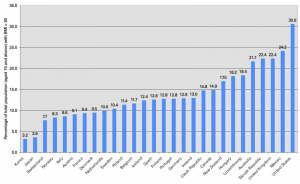ChrisL
Diamond Member
Yes, you were the one saying it happens to you so it is a good idea to cut it out of your diet? Correct? I say that most people can eat a sandwich made with wheat bread and will NOT gain 20 pounds. MOST people who have a weight problem have a weight problem because they overdo it.
"MOST" huh?
Link?
Medscape: Medscape Access
You just linked to a website registration page.
Perhaps wheat is clouding your perceptive abilities.
No. I didn't. The site comes up if you just click on the link. Don't know how to use a computer either, eh?
It's Not Genes: People Are Fat Because They Eat Too Much
Arthur L. Caplan, PhD
Disclosures | May 27, 2014

- 468 comments





Hi. I am Art Caplan, from the Division of Medical Ethics at the New York University Langone Medical Center in New York.
Why are your patients fat? Why are people fat generally? Struggling with weight is a problem. I personally have done better with it lately, but it is a challenge. We all know we are in the middle of an obesity epidemic in the United States. Indeed, worldwide obesity is an increasing problem.
If you look at the medical literature, the answer is clear. The problem is in our genes. Again and again, in media reports and in articles that catch the attention of editors at the most prominent medical journals, the answer to why we are all fat is that we have bad genes.
Think about it. You go to a cocktail party. You are chatting with people and you start talking about weight. The person says, "I'm one of those high metabolizers (or low metabolizers)," hinting that there is a genetic or biological basis for their size. Or people will say to me, "I must have inherited bad genes. I just can't seem to keep weight off."
We love the genetic explanation. That is why it was so interesting to see a paper recently in the British Medical Journal[1] that looked in a very different, but I believe a more fertile, direction for understanding the obesity problem.
Researchers from the University of Cambridge conducted a very simple study. They wanted to know how many fast-food outlets are in Cambridgeshire, the county that includes Cambridge and the university. They also looked at where people commuted to work, and whether there was any association between going by these fast-food places and obesity and diabetes.
Bad Food, Not Bad Genes
Guess what they found? If you put a bucket of fried chicken out every half-mile along the route people take to work and back, they are fatter. There is a correlation between fast-food outlets and being diabetic or being fat.
The point is this: Genes certainly play a role in how people handle food, but if you live in a culture that overwhelms you with opportunities to eat junk food and fatty food, even the best genes can easily be overwhelmed.
We are that kind of country, too. We promote eating more food. I took a ride recently from Moosic, Pennsylvania, to Wilkes-Barre. Having read this article, I decided to count how many fast-food places I could see from the road in a relatively rural area. The distance was 13 miles. I counted 19 kings, arches, colonels, and so on. Fast food is ubiquitous. Bad food opportunities are everywhere.
If we are going to get a handle on the obesity epidemic, then we need to stop saying, "All you have to do is control your diet, and somehow manage the responsibility that your genes gave you." Telling people they have a genetic basis for obesity is kind of an excuse, or an easy way out.
Stuffed, Part 1
Stuffed, Part 2
And for those who were goingwhen I linked it before being infatuated with their own voice:
The Dark side of "Healthy" Wheat
Stop eating so much and you won't be fat.
